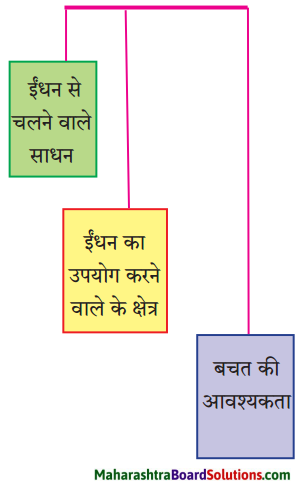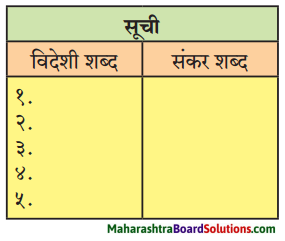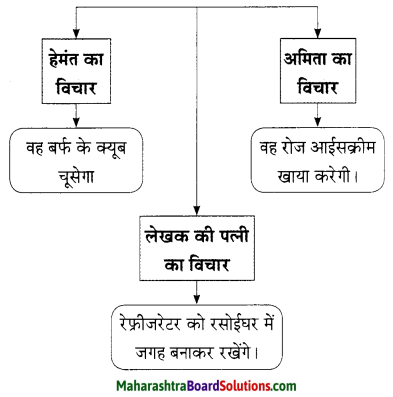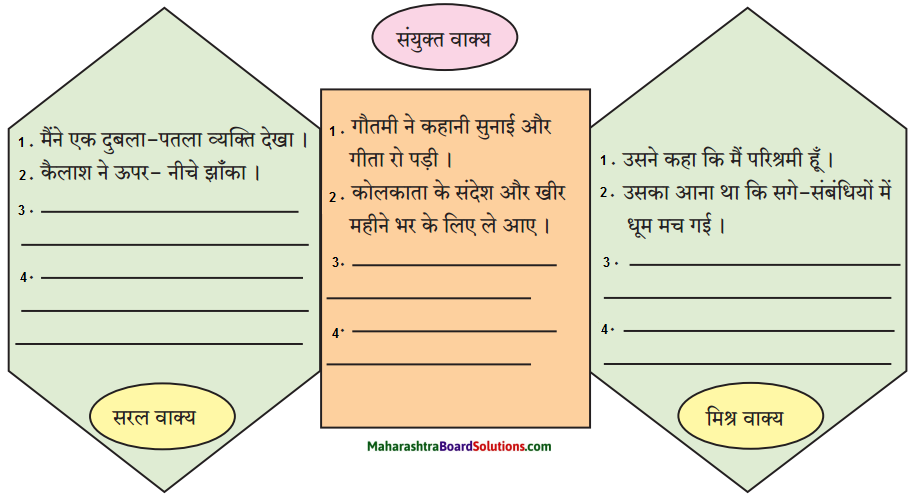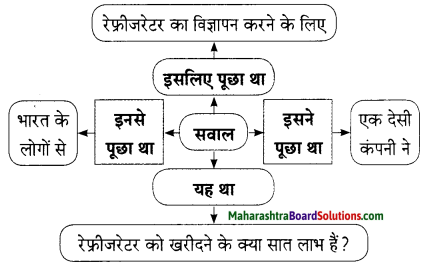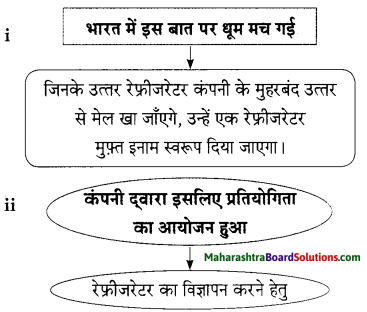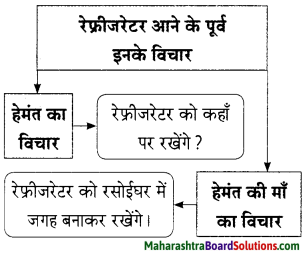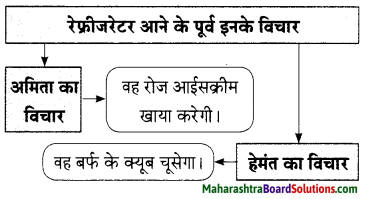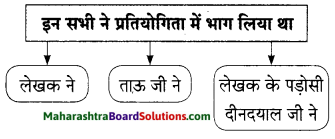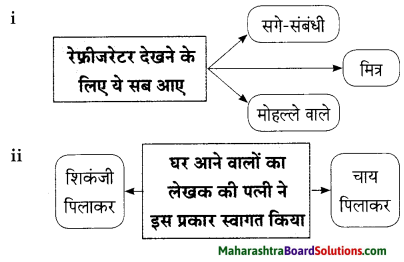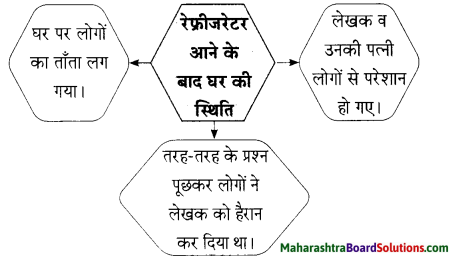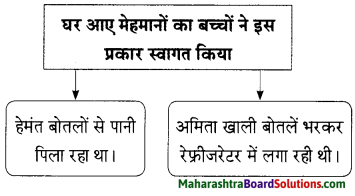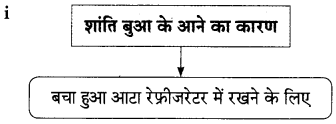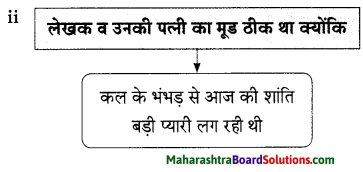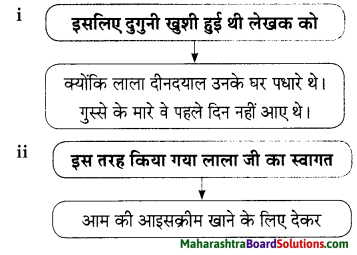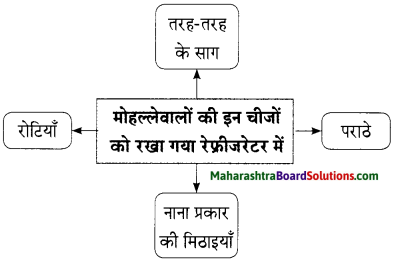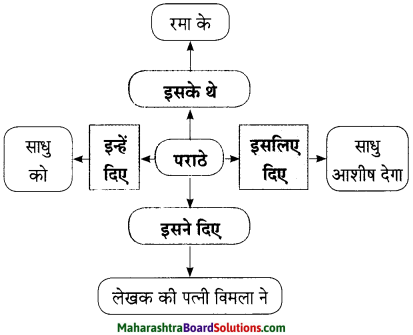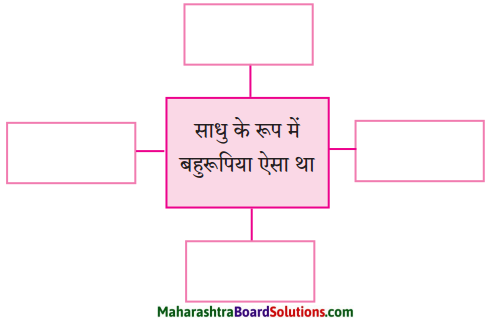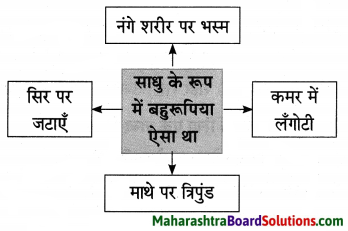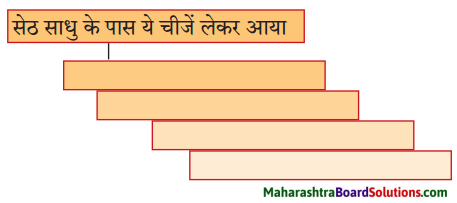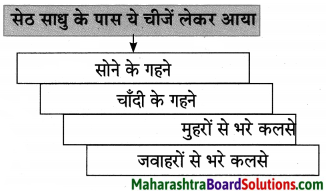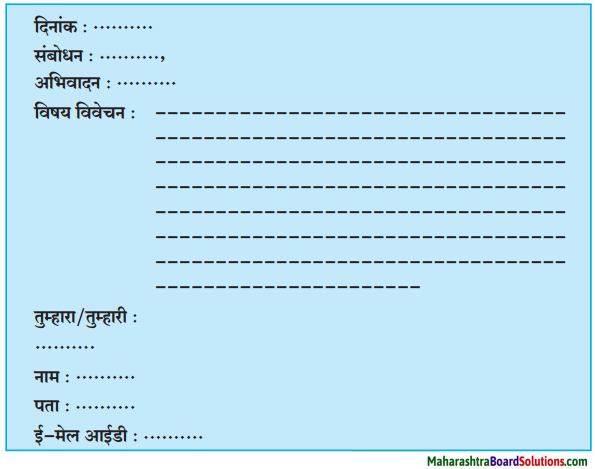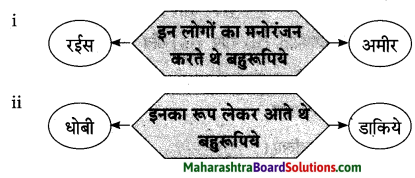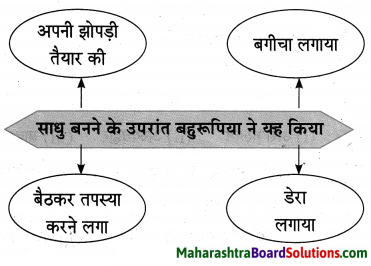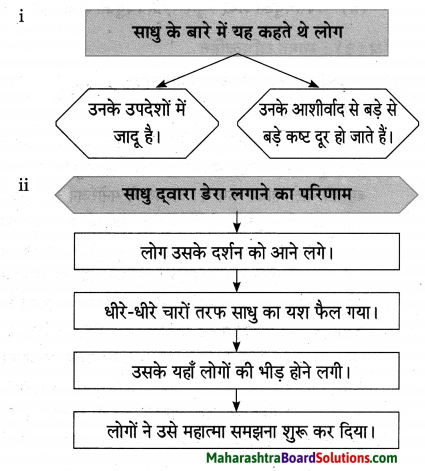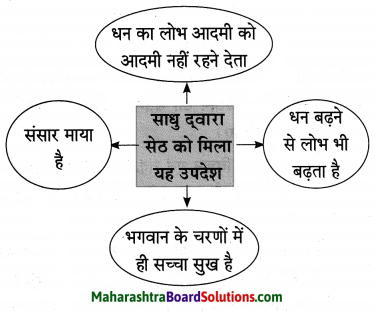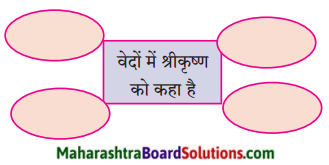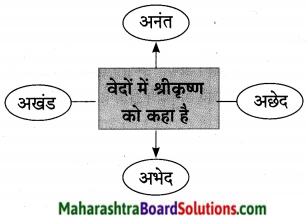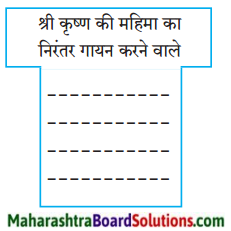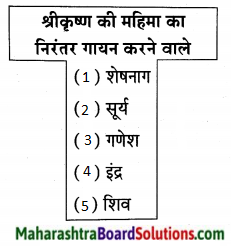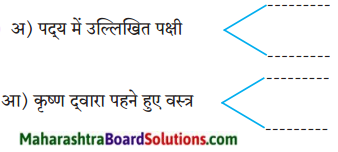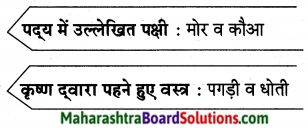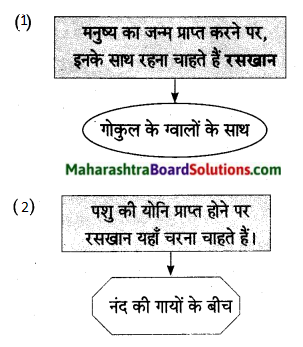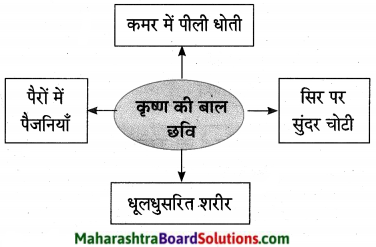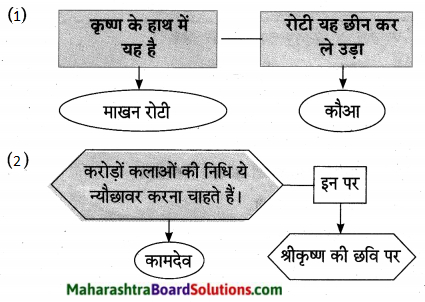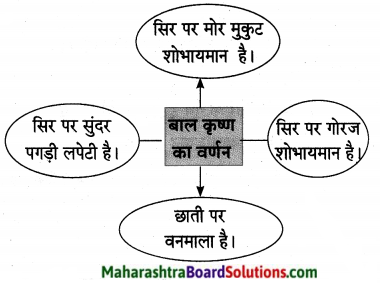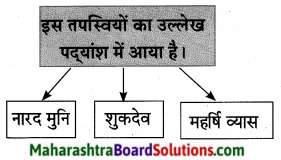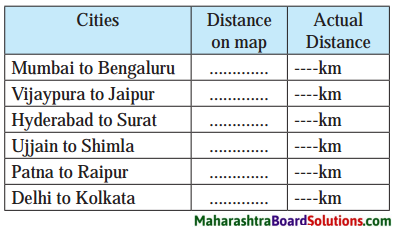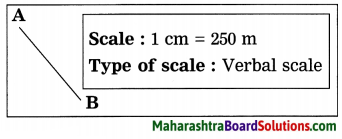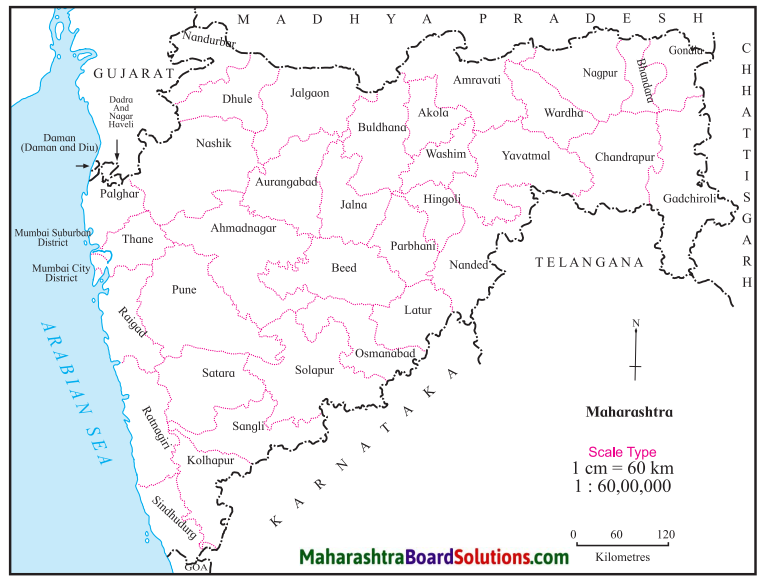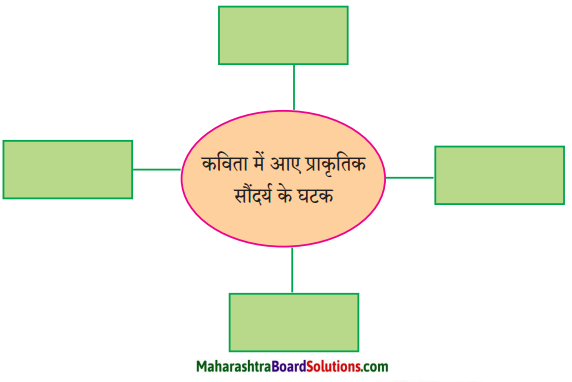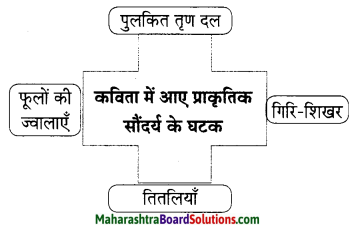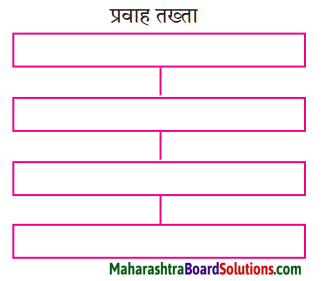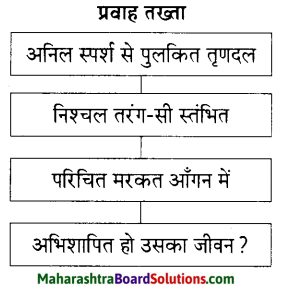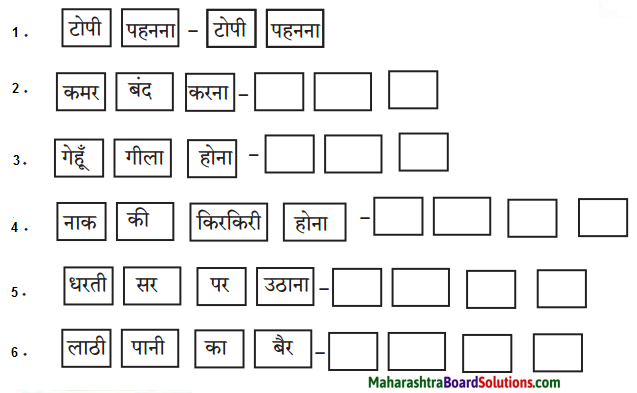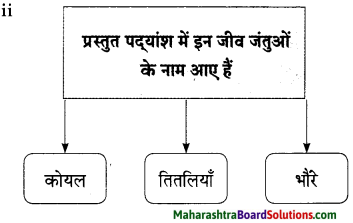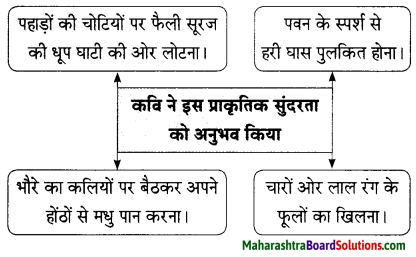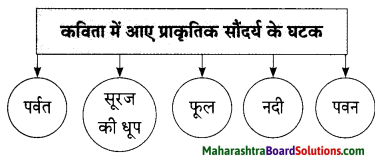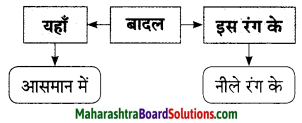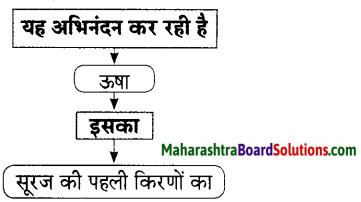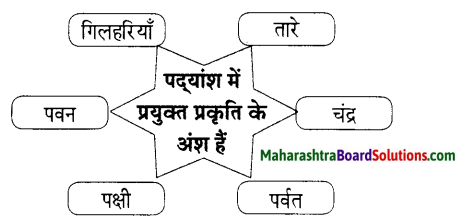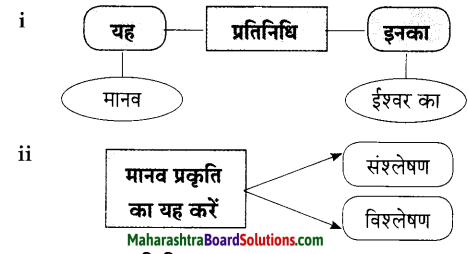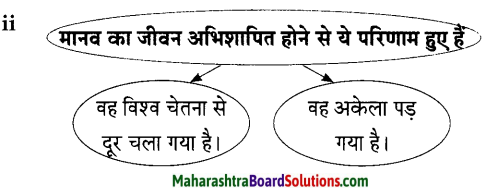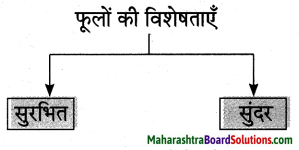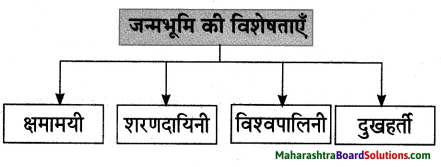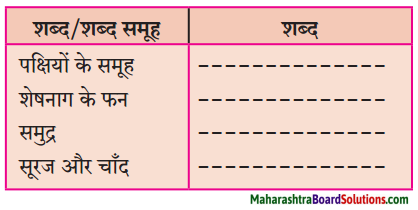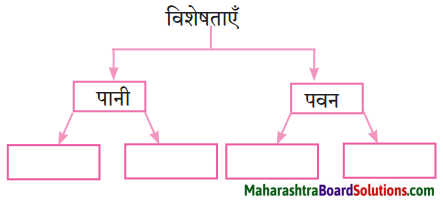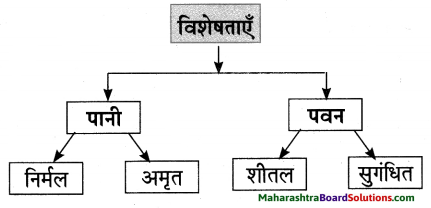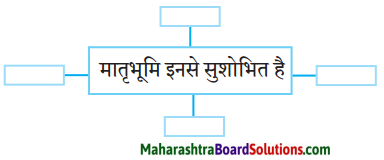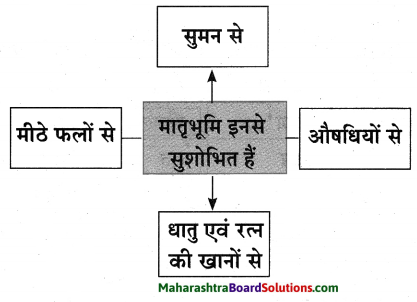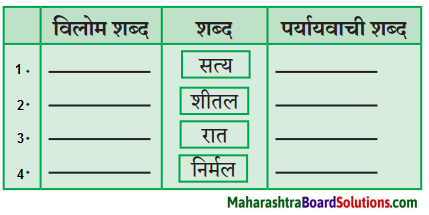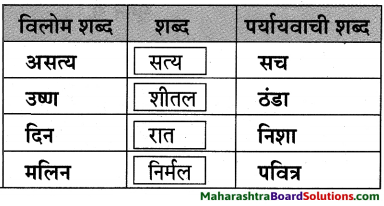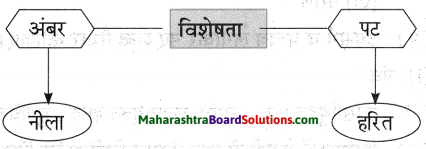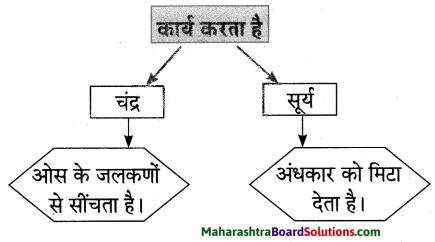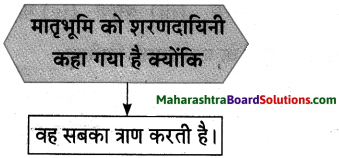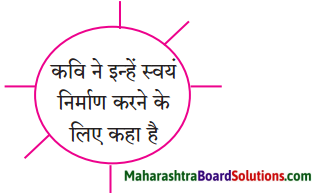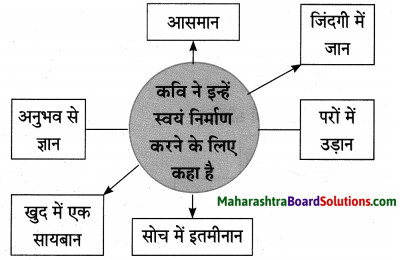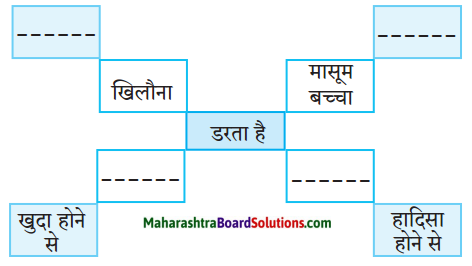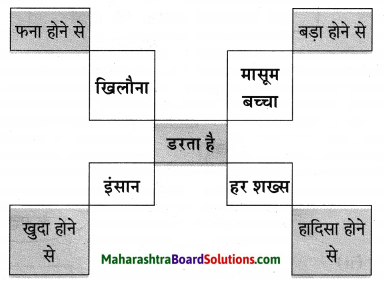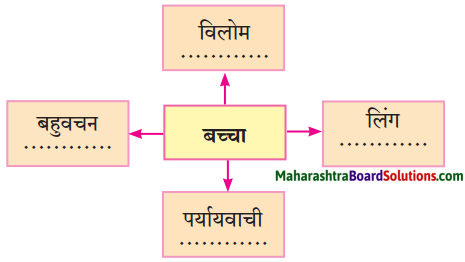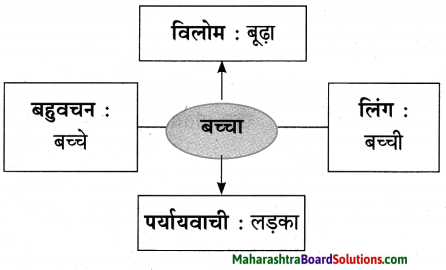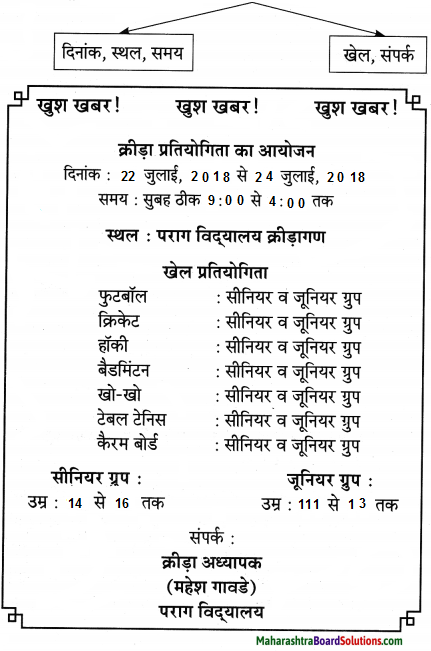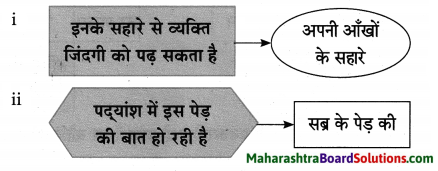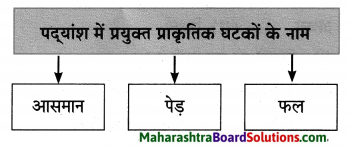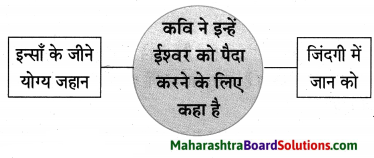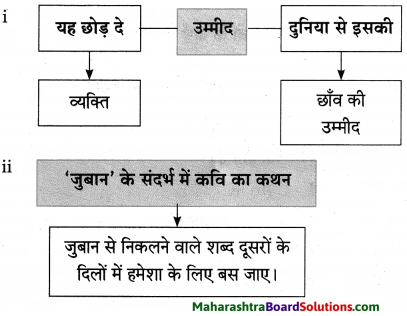Balbharti Maharashtra State Board Class 9 Hindi Solutions Lokbharti Chapter 8 उड़ान Notes, Textbook Exercise Important Questions and Answers.
Maharashtra State Board Class 9 Hindi Lokbharti Solutions Chapter 8 उड़ान
Hindi Lokbharti 9th Std Digest Chapter 8 उड़ान Textbook Questions and Answers
पठनीय:
प्रश्न 1.
‘दहेज’ जैसी सामाजिक समस्याओं को समझते हुए इसके संदर्भ में जनजागृति करने हेतु घोषवाक्यों का वाचन कीजिए।
![]()
श्रवणीय:
प्रश्न 1.
हिंदी-मराठी भाषा के प्रमुख गजलकारों की गजल रचना सुनिए और सुनाइए।
कल्पना पल्लवन:
प्रश्न 1.
‘मैं चिड़िया बोल रही हूँ इस विषय पर स्वयंप्रेरणा से लेखन कीजिए।
आसपास:
प्रश्न 1.
अंतरजाल की सहायता लेकर कोई कविता पढ़िए और निम्न मुद्दों के आधार पर आशय स्पष्ट कीजिए:

पाठ के आँगन में…
1. सूचना के अनुसार कृतियाँ कीजिए।
प्रश्न 1.
सही पर्याय चुनकर लिखिए।
परों में शक्ति हो तो ………..
उत्तर:
(क) उपलब्ध नभ को नापना है।
(ख) उपलब्ध जल को नापना है।
(ग) भू को नापना है।
![]()
प्रश्न 2.
सुलगते आप, बाहर से …………
(क) तपन नहीं माँगा करते।
(ख) अगन नहीं माँगा करते।
(ग) बुझन नहीं माँगा करते।
उत्तर:
1. परों में शक्ति हो तो उपलब्ध नभ को नापना है।
2. सुलगते आप, बाहर से अगन नहीं माँगा करते।
प्रश्न 3.
निम्नलिखित काव्य पंक्तियों का सरल भावार्थ लिखिए। अँधेरे के इलाके में ………….. नमन माँगा नहीं करते।
भावार्थ:
प्रस्तुत गजल में कवि कहते हैं, “इंसान के पास स्वाभिमान का होना बेहद जरूरी होता है। उसे अँधेरे के इलाके में किरण नहीं माँगनी चाहिए। यानी जब संकट की स्थिति आ जाएँ; तब इंसान को स्वयं ही उसके साथ संघर्ष करना चाहिए। किसी से मदद नहीं मांगनी चाहिए। जहाँ पर कंटकों का यानी काँटों का बन होता है; वहाँ पर काँटों के अलावा कुछ नहीं होता है। वहाँ पर सुमन नहीं हो सकते हैं। अर्थात संकट की परिस्थितियों में सर्वत्र काँटे-ही-काँटे होते हैं। वहाँ पर दुख-दर्द व पीड़ा ही होती है। वहाँ पर हम सुख की अपेक्षा नहीं कर सकते।”
“जो व्यक्ति सचमुच आदर का अधिकारी है उसके सामने दुसरे लोगों के मस्तक अपने आप झुक जाते हैं। ऐसे व्यक्ति को किसी से नमन या आदर मांगने की जरूरत नहीं होती बल्कि उसे तो अपने आप आदर मिल जाता है। व्यक्ति के पास विनम्रता होनी चाहिए।”
प्रश्न 4.
कविता द्वारा दिया गया संदेश अपने शब्दों में लिखिए।
उत्तरः
प्रस्तुत कविता के माध्यम से कवि ने व्यक्ति को मानवीय गुणों को स्वीकार करने के लिए कहा है। स्वाभिमान, विनम्रता, दूरदृष्टि, बुलंद हौसले आदि गुणों को स्वीकार करने से व्यक्ति प्रगति की ऊंची उड़ान भर सकता है। फिर उसके लिए कुछ भी असंभव नहीं होगा। जिस व्यक्ति के पास मानवीय गुण होते हैं उन्हें किसी के भी पास हाथ फैलाने की आवश्यकता नहीं होती है। ऐसे लोगों को समाज में मान-सम्मान कीर्ति व यश अपने आप मिल जाता है। अत: व्यक्ति के पास मानवीय गुणों का होना जरूरी होता है।
प्रश्न 5.
कविता में प्रयुक्त विरामचिह्नों के नाम लिखकर उनका वाक्य में प्रयोग कीजिए।
उत्तरः
(,) – अल्पविराम
बाक्य: राम ने दुकान से शक्कर, मिठाई व खजूर लाए।
(|) – पूर्णविराम
वाक्य: अजय शहर गया है।
![]()
प्रश्न 6.
संजाल

उत्तरः

कल्पना पल्लवन:
प्रश्न 1.
“”मैं चिड़िया बोल रही हूँ।” इस विषय पर स्वयंप्रेरणा से लेखन कीजिए।
उत्तरः
“पंछी बनू उड़ती फिरूं मस्त गगन में
आज मैं आजाद हूँ दुनिया के चमन में।”
मुझे आज भी याद है पुरानी फिल्म का यह गीत । सचमुच पंछी बनकर खुले आसमान में विचरण करना सभी को अच्छा लगेगा। किसी की कुछ भी रोक-टोक नहीं और नहीं किसी-का कुछ झंझट । बस सिर्फ आसमान में स्वच्छंद होकर उड़ना। बताओ किसे अच्छा नहीं लगेगा? संध्या समय पीपल के नीचे बैठकर मेरे मन में ये विचार आ ही रहे थे तभी अचानक पीपल के पेड़ पर बैठी एक चिड़िया ने ची-चीं करते हुए मुझे आवाज दी और वह मेरे समक्ष आकर बैठ गई। फिर अपने बारे में कहने लगी।
“मैं हूँ नन्ही-सी, प्यारी-सी चिड़िया। इस पेड़ पर ही मेरा निवास है। देख रही हो वह घोंसला? कितने प्यार से मैंने बनाया है! उसका निर्माण करने के लिए मुझे तकरीबन एक महीना लगा है। न जाने मैंने कहाँ-कहाँ से उसे तैयार करने के लिए सामग्री इकट्ठा की है? बस ईश्वर ही इस बात का साक्षी है। मैंने अपनी चोंच में तिनका-तिनका लाकर स्वयं के लिए सुंदर भवन का निर्माण किया है। उस घोंसले में मेरे दो अंडे हैं। अब जल्द ही दो नन्हे-मुन्ने बच्चे मेरे घर आएँगे। अब मैं उन्हीं का इंतजार कर रही हूँ।
पीपल के इस पेड़ पर पहले मेरे कई भाई-बहन रहा करते थे। तोता, मैना आदि मेरे भाई बहन मनुष्य द्वारा निर्मित प्रदूषण के शिकार हो गए। अब न इस पेड़ पर कोई तोता आकर बैठता है और न कोई मैना। कौओं की भी काँव-काँव अब पहले जैसे सुनाई नहीं दे रही है। मनुष्य ने अपने स्वार्थ के लिए पेड़ों की अंधाधुंध कटाई की। इसका परिणाम यह हुआ कि पक्षियों की संख्या कम होती गई। अब तो शहरों से पक्षी नदारद हो गए हैं।
मैंने सुना है कि कुछ संस्थाएँ पक्षी-दर्शन जैसे कार्यक्रमों का आयोजन करती रहती हैं और कर्नाला पक्षी अभयारण्य जैसे स्थलों पर जाती रहती है। लेकिन मेरी प्यारी बहना, सच कहूँ तो वहाँ पर भी अब पहले जैसे पंछी नहीं रहें। पहले जैसे पंछियों का कलरव अब सुनाई नहीं देता है। इसके लिए इंसान ही जिम्मेदार है। यह सब उसी के कार्य का परिणाम है। यदि इंसान अपने किए कराए से बाज नहीं आएगा; तो भविष्य में अपने लिए गड्ढा स्वयं ही खोद लेगा।
हम ही इस सुंदर धरती का अंश हैं। हमें भी जीवन जीने का अधिकार है। आखिर हम भी एक जीव हैं। इंसान को कोई अधिकार नहीं है कि वह हमारे अधिकार को छीन लें। उसे प्राकृतिक संतुलन के बारे में सोचना चाहिए। जब इंसान “जिओ और जीने दो” इस सूत्र को अपनाएगा तब उसका जीवन भी खुशहाल हो जाएगा और यह प्यारी धरती फिर से ‘सुजलाम् सुफलाम्’ बन जाएगी।
![]()
Hindi Lokbharti 9th Answers Chapter 8 उड़ान Additional Important Questions and Answers
(क) पद्यांश पढ़कर दी गई सूचना के अनुसार कृतियाँ कीजिए।
कृति (1) आकलन कृति
प्रश्न 1.
आकृति पूर्ण कीजिए।
उत्तर:

कृति (2) आकलन कृति
प्रश्न 1.
समझकर लिखिए।
उत्तर:

कृति (3) भावार्थ
प्रश्न 1.
निम्नलिखित पंक्तियों का भावार्थ अपने शब्दों में लिखिए। परों में शक्ति …………….. गगन माँगा नहीं करते।
भावार्थः
प्रस्तुत गजल में कवि कहते हैं, “जिनके पंखों में शक्ति होती है वे संपूर्ण आसमान को नाप लेते हैं। यानी जिनके पास साहस व वीरता होती है या जिनके हौसले बुलंद होते हैं; वे असंभव कार्य को संभव करते हैं। जैसे कि आसमान में विचरण करना या उड़ना तो पंछियों का काम होता है और वे तो गगन में नित्य संचार करते रहते हैं। उन्हें उड़ने के लिए किसी से गगन माँगने की आवश्यकता नहीं होती है अर्थात जहाँ चाह, वहाँ राह अपने आप निर्माण हो जाती है।’
![]()
(ख) पद्यांश पढ़कर सूचना के अनुसार कृतियाँ कीजिए।
कृति (1) आकलन कृति
1. सही विकल्प चुनकर लिखिए।
प्रश्न 1.
व्यक्ति को इसके सपने अपने आप आते हैं ……………
उत्तर:
(क) जिससे वह मन व प्राण से प्यार करता है।
(ख) जिससे वह नफरत करता है।
(ग) जिससे वह सहायता की अपेक्षा करता है।
प्रश्न 2.
ये अग्नि की माँग नहीं करते हैं …….
(क) जिन्होंने पश्चात्ताप की अग्नि में जलना स्वीकार किया है।
(ख) जिन्होंने पश्चात्ताप की अग्नि में जलना अस्वीकार किया है।
(ग) जन्होंने पश्चात्ताप की अग्नि में दूसरों को जलाना तय किया
उत्तर:
1. व्यक्ति को इसके सपने अपने आप आते हैं जिससे वह मन व प्राण से प्यार करता है।
2. ये अग्नि की माँग नहीं करते हैं जिन्होंने पश्चात्ताप की अग्नि में जलना स्वीकार किया है।
कृति (2) आकलन कृति
प्रश्न 1.
पद्यांश पढ़कर ऐसे दो प्रश्न तैयार कीजिए जिनके उत्तर
निम्न शब्द हों।
1. निमंत्रण
2. पश्चात्ताप
उत्तर:
1. किसके बिना सपने अपने आप आते हैं?
2. पद्यांश में किस अग्नि में जलने की बात हो रही है?
![]()
कृति (4) भावार्थ
प्रश्न 1.
निम्नलिखित पंक्तियों का भावार्थ अपने शब्दों में लिखिए। जिसे मन प्राण …………….. माँगा नहीं करते।
भावार्थ:
जिन लोगों ने अपने आप को पश्चात्ताप की आग में जलना स्वीकार कर लिया है, उन्हें कैसे कोई रोक सकता है? ऐसे लोग पश्चात्ताप की अग्नि में अंदर से सुलगते रहते हैं; लेकिन वे बाहर से अग्नि की माँग नहीं करते हैं। पश्चात्ताप की अग्नि से बढ़कर कोई दूसरी अग्नि नहीं हो सकती।
(ग) पद्यांश पढ़कर सूचना के अनुसार कृतियाँ कीजिए।
कृति (1): आकलन कृति
प्रश्न 1.
समझकर लिखिए।
उत्तर:

प्रश्न 2.
आकृति पूर्ण कीजिए।
उत्तर:

कृति (3): भावार्थ
प्रश्न 1.
निम्नलिखित पंक्तियों का भावार्थ अपने शब्दों में लिखिए। खुशबू देती है …………….. धूपदान होती है।
भावार्थ:
प्रस्तुत पंक्ति ‘उड़ान’ इस गजल से ली गई है और इसके कवि चंद्रसेन विराट जी हैं। धूप जब जलता है; तब वह सभी को खुशबू देता है। शायर की जिंदगी भी धूपदान की तरह होती है। वह अपनी शायरी से लोगों के जीवन में खुशबू भर देता है।”
![]()
पद्य-विश्लेषण:
- कविता का नाम – उड़ान
- कविता की विधा – गजल
- पसंदीदा पंक्ति – एक बहरे को एक गूंगा दे, जिंदगी वो बयान होती है।
- पसंदीदा होने का कारण – उपर्युक्त पंक्ति मुझे बेहद पसंद है क्योंकि उसमें एकदूसरे की सहायता करने से जिंदगी बड़े आराम से कटती है।
- कविता से प्राप्त संदेश या प्रेरणा – प्रस्तुत कविता से प्रेरणा मिलती है कि व्यक्ति को स्वाभिमानी व विनम्र होना चाहिए। उसके हौसले बुलंद होने चाहिए। उसे मानवीय गुणों को अपनाकर स्वयं का जीवन सुंदर बनाना चाहिए।
उड़ान Summary in Hindi
कवि-परिचय:
जीवन-परिचय: कवि चंद्रसेन विराट जी हिंदी साहित्य के आधुनिक रचनाकारों में से एक हैं। इनका जन्म ३ दिसंबर १९३६ को इंदौर मध्य
प्रदेश में हुआ। ये हिंदी साहित्य जगत में गजलकार के रूप में प्रसिद्ध हैं। इन्होंने अपनी गजलों में आम आदमी के जीवन
को अभिव्यक्त करने का सफल प्रयास किया है। इन्होंने गजल के साथ-साथ गीतों का भी लेखन किया है।
प्रमुख कृतियाँ: गीत संग्रह – ‘मेंहदी रची हथेली’, ‘स्वर के सोपान’, ‘मिट्टी मेरे देश की’, ‘धार के विपरीत’ आदि; गजल संग्रह – ‘आस्था
के अमलतास’, ‘कचनार की टहनी’, ‘न्याय कर मेरे समय’ आदि; मुक्तक संग्रह – कुछ पलाश कुछ पाटल, ‘कुछ सपने’, ‘कुछ सच’ आदि।
पदय-परिचय:
गजल: गजल काव्य विधा का एक प्रकार है। एक ही बहर और वजन के अनुसार लिखे गए शेरों के समूह को ‘गजल’ कहते हैं। गजल
के पहले शेर को ‘मतला’ और अंतिम शेर को ‘मकता’ कहते हैं।
प्रस्तावना: ‘उड़ान’ इस गजल में गजलकार चंद्रसेन विराट जी ने मानवीय मूल्यों के दर्शन करवाए हैं। व्यक्ति के पास स्वाभिमान, विनम्रता, दूरदृष्टि व बुलंद हौसले होने चाहिए। इन गुणों से ही जीवन में व्यक्ति ऊँचा उठता है।
सारांश:
प्रस्तुत कविता गजल विधा में लिखी गई है। व्यक्ति के पास मानवीय गुणों का होना बहुत जरूरी होता है। मानवीय गुणों के कारण व्यक्ति का व्यक्तित्व विकसित होता है। व्यक्ति के पास स्वाभिमान का होना बेहद जरूरी होता है। स्वाभिमान के कारण व्यक्ति ऊँचा उठता है। जिसके पास विनम्रता होती है; उसे समाज में आदर अपने आप मिलता है। जिनके हौसले बुलंद होते हैं; उनके लिए असंभव कुछ भी नहीं होता। जीवन में व्यक्ति को एक-दूसरे की सहायता करनी चाहिए। जीवन में सभी को खुशी देने का प्रयास करना चाहिए। आखिर चार दिन की जिंदगी होती है। उसी में स्वयं खुश रहकर दूसरों के भी जीवन में खुशियाँ भर देनी चाहिए।
![]()
शब्दार्थ:
- अगन – अग्नि, आग
- सायबान – छाया देने वाला
- बयान – वक्तव्य
- तीर – बाण
- कमान – धनुष
- इलाका – क्षेत्र
- कंटक – काँटा
- आदर – सम्मान
- पर – पंख
- थकान – थकावट
- शायर – शायरी लिखने वाला
भावार्थ:
अँधेरे के इलाके में ………………. सुमन माँगा नहीं करते।
प्रस्तुत गजल में कवि कहते हैं, “इंसान के पास स्वाभिमान का होना बेहद जरूरी होता है। उसे अँधेरे के इलाके में किरण नहीं माँगनी चाहिए। यानी जब संकट की स्थिति आ जाए; तब इंसान को स्वयं ही उसके साथ संघर्ष करना चाहिए। किसी से मदद नहीं माँगनी चाहिए। जहाँ पर कंटकों का यानी काँटों का वन होता है वहाँ पर काँटों के अलावा कुछ नहीं होता है। वहाँ पर सुमन नहीं हो सकते हैं। अर्थात संकट की परिस्थितियों में सर्वत्र काँटे-ही-काँटे होते हैं। वहाँ पर दुख-दर्द व पीड़ा ही होती है। वहाँ पर हम सुख की अपेक्षा नहीं कर सकते।
